For as long as I can remember, I have always had obsessive thoughts. These thoughts would make me do certain rituals; if I didn’t do them, I believed something bad would happen. That is what obsessive behavior can do. As a child, and even now at 29 years old, I have had obsessive thoughts such as needing to make sure the faucets in bathrooms are turned off completely or that my clothes have no spots on them. If I don't pay attention to these thoughts, I fear that there is a chance of a flood in the house or that people will denigrate me when they notice a spot on my clothing. The thoughts come and go. While I sometimes got fixated on these thoughts, they didn’t seriously affect my mental health until my college years. That was when I began to recognize signs of a possible disorder.
During my senior year in college, I began having the obsessive existential thought: "I don't like to see". This thought bothered me a lot. The thought was so powerful that I started believing that I did not really like to see. This thought caused me great emotional distress; what’s more, I started having other intrusive and unwanted obsessive thoughts. I was now caught in a spiral of thinking unwanted thoughts; they lead to anxiety and depression. My anxiety caused a racing heartbeat, feeling nervous, scared and panicky. Simultaneously, my depression caused decreased appetite and concentration, fatigue, lack of pleasure and excitement as well as feelings of sadness. I knew something was wrong and I could not shake it away on my own. This was when I decided I needed professional help.
My first stop for help was seeing a psychiatrist who explained to me about Selective Serotonin Reuptake Inhibitor (SSRI) medications , commonly known as antidepressants. I was hesitant to take any because I have always had bad reactions to medications. However, because of my trust in the psychiatrist, I started taking Zoloft. Over a span of six weeks, gradually he increased the dosage to 150mg. With the 150mg of Zoloft, all of a sudden, I had more energy, better concentration, appetite and a more regular sleep cycle. The psychiatrist felt that my symptoms were part of Obsessive Compulsive Disorder (OCD), a specific type of emotional and behavioral difference. He recommended that, in addition to taking the medication, I see a therapist who would provide cognitive behavioral therapy (CBT)
I accepted his recommendation and found a therapist who specialized in CBT and I started seeing her once a week. She helped me implement a daily schedule to control the obsessive thoughts, plan for pleasurable activities, and use my rational scrutiny to test my irrational depressive thoughts. Therapy was not always easy. There were times I struggled and failed, and times when I did not want to continue the hard work to get better. As time went on, however, I found that I had an inner strength that made me trust my professional support system and pushed me to keep going; I knew that, eventually, I would get out of my episode. So, with months of hard work, in combination with my medication, my obsessive thoughts decreased and my depression and anxiety subsided.
My treatment team was a big asset to my life and well being. The therapies and the emotional support of my professional treatment team and my friends and family helped me get trough my struggles. I believe that, without them, I would not be at the point I am at today. The experience of living through severe bouts of OCD has given me emotional strength. I have learned over time to always stay positive and know that bad times don't last forever. We all live in an imperfect world in which everyone has struggles of one kind or another. OCD, anxiety and depression are my struggles.



